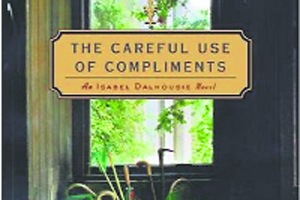She Dun It
Fictions detectives are interesting because they are flawed. But heres a lady detective whos just so morally evolved.

Fictions detectives are interesting because they are flawed. But heres a lady detective whos just so morally evolved.
If you happen to derive happiness from the publication of an Alexander McCall Smith novel,then you must know you are in luck. This former professor of medical law at the University of Edinburgh is most celebrated for the adventures of Precious Ramotswe,the traditionally built chief of the No. 1 Ladies Detective Agency in Botswana. This year he published the eleventh instalment,The Double Comfort Safari Club. This month a visit to the bookshop yielded two more books hot off the McCall Smith assembly line:
Isabel Dalhousie is such an evolved moral being,her life experiences unfold so aesthetically,that it is somewhat embarrassing to admit that shes a personal favourite. Crime/detective fiction today is a landscape for flawed characters,for a volatile equilibrium towards an imperfect justice,for sleuths who find in their chronic loneliness the capacity to imagine the architecture of human relationships. To be an investigator worth your salt,you cannot be in a position to sort out yourself for a happy,ethical ending by each books end.
Dalhousie does just that. A forty-something philosopher,she inhabits a perfectly appointed home in Edinburgh. Inheritor to a massive fortune,she indulges her passion for art,but thoughtfully,while giving away to good causes with the proper etiquette of never talking about it. For a while,she did bear a degree of oppression. As an underpaid editor of the Review of Applied Ethics,she had to put up with the machinations of philosophers on its editorial board. But then,a few books ago,she swatted them by simply buying the magazine. How do you,as a reader,account for tolerance of such perfection?
In fact,how do you even qualify her as a detective,howsoever amateur? To answer that question is,in a way,to inquire into our fascination with crime fiction. At some point in the past decade it became impossible to conduct a conversation between two readers without mention of their favourite writers of crime fiction coming up. In essence,its like this. To not read crime fiction is simply not an option; but then again,you cannot be indiscriminate,you need very clear preferences. Some like the Scandinavians Stieg Larsson helped and they tend to bleakness of landscape and spirit. Some of us like warmer climates and along with the Italian investigators,we are thrilled at every instalment of Blafts compilations of Tamil pulp fiction and translations of Surender Mohan Pathaks books. In fact,name any part of the world,and you get amazing crime fiction set there. And why,we even got a better measure of Tony Blair from a murder mystery The Ghost by Robert Harris which was adapted to the film The Ghost Writer than we did from his memoirs.
Why this popularity? The grand old lady of the genre,PD James,offered a clue recently in Talking About Detective Fiction: WH Auden states that the most curious fact about the detective story is that it appeals precisely to people who are immune to other forms of what he describes as daydream literature. He suspects that the typical reader of detective stories is,like himself,a person who suffers from a sense of sin,by which he is not implying that mysteries are read solely by law-abiding citizens so that they may gratify vicariously the impulse to violence. It,in a private way,helps the reader sort out her moral universe.
If that be it,if murder that must be at the heart of crime fiction is the ultimate contaminating crime that blurs the lines between what is private and whats not,Dalhousies investigations are a challenge. Like the typical detective,she is a natural meddler,she cannot stop herself from prying. In a competitive environment of gruesome murders,to her fall what may be gentler crimes: in The Charming Quirks of Others,its nothing more contaminating than a spiteful letter. But as she goes about intruding into peoples lives to solve the mystery,every pace is measured by its ethical dimensions. When she is inquiring about a suspect from his cousin,she makes sure she does not lie about knowing him,and says instead,I havent seen him recently. Yet she is troubled by the deception of it. In short,in a narrative without the ultimate crime,she attains the status of a detective by honing the detectives skills. Perhaps McCall Smith is suggesting that the impulses of our favourite detectives are not much different from our daily curiousness.
mini.kapoorexpressindia.com